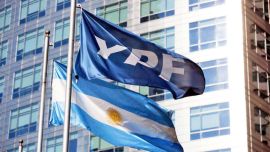It took decades for scientists to reach a consensus that the climate was changing. In politics, things normally move faster, but it can still take some time to detect changes as they happen. Given the events of the last week, perhaps it’s time to ask: are Argentina’s electoral poles beginning to melt?
There are no certainties, and this year’s long electoral calendar will require a refined gauge of political climates. Minor changes not always perceptible to the common eye might be indicative of larger, relevant and permanent shifts. Interestingly, the coming election in Córdoba, on May 12, and last Sunday’s vote in Neuquén, have fuelled agony both inside the ruling Cambiemos coalition and the Kirchnerite Peronist opposition.
In Córdoba, Cambiemos imploded. This is not just any given province for the president: the ruling coalition was born in the Córdoba district of Marcos Juárez in September, 2014, with a mayoral victory. That model was then replicated at a national level one year later, catapulting Mauricio Macri – somehow unexpectedly – to the presidency with a run that included a massive share of the vote from Córdoba (72 percent in the second round in November, 2015).
This time around, the coalition failed to agree on a unity ticket to fight the Peronists that have ruled the province since 1999. It could not agree either on the terms of a primary to settle the dispute. As a result, there will be two tickets: one led by Córdoba City Mayor Ramón Mestre, son of the similarly named last non-Peronist governor of Córdoba, with the other headed by Deputy Mario Negri, who has the Casa Rosada’s favour. The division leaves the road wide open for Peronist Governor Juan Schiaretti to win re-election, without too much effort.
The government did not do enough to avert the schism. Only now does the symbolic relevance of the division seem to be sinking in. “We did not want this to happen,” Macri said on Thursday. “Hopefully it is not happening in the rest of the country.” The president hopes Córdoba will not be this time an indication of what the future may bring for the ruling coalition, but he can’t be sure. With the economy in a deep recession and the president’s low approval ratings generating diffidence, the PRO and the Radicals are on their worst terms for some time.
Last weekend’s vote in Neuquén did not contribute to coalition harmony either. Cambiemos finished in way down in, with 16 percent of the vote, almost five percentage points below their performance in 2015 and 12 points below their performance in the 2017 midterm election. Its candidate there was a Radical, Horacio ‘Pechi’ Quiroga, the mayor of the provincial capital. Some Radicals suspect the government did not endorse Quiroga strongly enough. It didn’t, but for good reason.
The stakes were high in Neuquén, home to the country’s shale jewel Vaca Muerta and the focus of international investors’ attention. The government feared the province could swing from the decades-long control of the catch-all, pro-business provincial Neuquén People’s Movement (MPN) grouping to a Peronist ticket that would be wholeheartedly endorsed by ex-president Cristina Fernández de Kirchner in the race’s final sprint. It looked tighter than what it turned out to be: the MPN won re-election for incumbent Governor Omar Gutiérrez by 13 points over Peronist candidate Ramón Rioseco, a former picket leader.
When it comes down to it, victory or defeat in politics is almost entirely measured against expectations. The united Peronists hoped a possible upset in Neuquén would kick-start a chain-reaction of CFK-led Peronist united groups nationwide prior to the August primaries and the October presidential vote. That did not happen, and what it sparked instead was scepticism over whether rallying around the former president is actually a viable road to political glory at all.
If this ‘pole-melting’ trend continued, a wider crack could open up for those targeting the middle. Former economy minister Roberto Lavagna is making more and more explicit moves toward his candidacy, and he has been endorsed by an outsider with popularity and street credibility: television host Marcelo Tinelli, who is likely to seek a candidacy of some sort this year in what would be his full-scale political début. This group’s chances, blended with the two non-Kirchnerite Peronists who have already said they want to run – Sergio Massa and Juan Manuel Urtubey – would increase dramatically if Cristina decided not to run.
Will she or won’t she? That is the top question in Argentine
politics today. Fernández de Kirchner has been a master in the
art of temporising, and nobody really knows for certain what
she will do. There are those inside her inner circle who say her
main goal this year is to defeat the government – even if she
is not the person directly doing it. The promoters of this theory
argue her sudden trip to Cuba this week to visit her daughter
Florencia, reportedly suffering from an eating disorder and
panic attacks caused by stress, may be a first step toward
stepping down, on the grounds that she has already paid too
high a personal price, with the death in 2010 of her late husband, former president Néstor Kirchner. Wait and see: all this
has to be settled before the evening of June 22.related news





















Comments